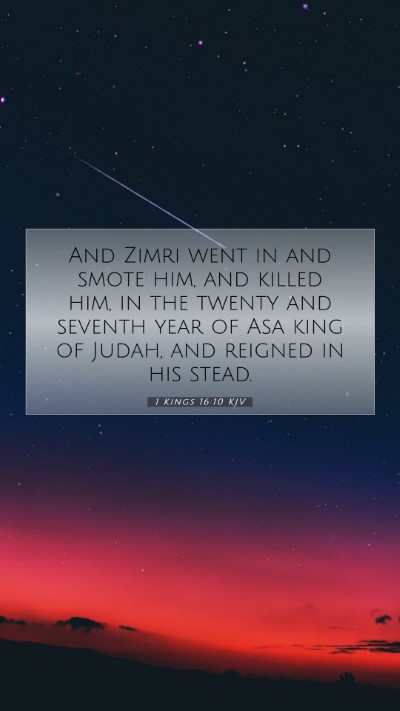Bible Verse Commentary on 1 Kings 16:10
Verse Reference: 1 Kings 16:10 - "And Zimri went in and smote him, and killed him, in the twenty-seventh year of Asa king of Judah, and reigned in his stead."
Overview: This verse captures a critical moment in the narrative of the divided kingdoms of Israel and Judah, illustrating the tumultuous period of political intrigue and assassination. Here, Zimri's rise to power through the violent act of murder highlights the instability and moral decline in Israel's leadership.
Meaning of the Verse
The events surrounding this verse indicate a pivotal shift in leadership. The actions of Zimri depict a broader theme of moral decay and the consequences of sin that plagued Israel’s kings. This verse serves as a reminder of the often violent and treacherous means by which power was seized in biblical times.
Bible Verse Interpretations
- Matthew Henry's Commentary: Henry emphasizes the swift and brutal nature of Zimri's actions, pointing out that such rise to power through violence reveals the corrupt heart of man. He notes that this act of treachery underscores the instability that characterized the monarchy in Israel.
- Albert Barnes' Notes: Barnes discusses the political context during this period, highlighting that Zimri's assassination of Elah demonstrates the ruthless ambition that led to further disintegration of the kingdom. He connects this moment to the broader narrative of the Israelite kings' disobedience to God.
- Adam Clarke's Commentary: Clarke elaborates on Zimri's actions, interpreting the event as a fulfillment of God’s judgment on the house of Baasha. Clarke often emphasizes the importance of divine justice and the consequences of turning away from God's commands.
Understanding Scripture
This passage illustrates several key themes in the broader biblical narrative:
- The Fragility of Authority: Zimri’s rapid ascendancy to power through murder reflects the fragile nature of authority in a kingdom continually divided by sin and idolatry.
- The Role of Prophecy: The events align with the prophetic curse against the house of Baasha, which offers readers an understanding of how divine punishment can manifest through human actions.
- The Consequences of Sin: Zimri's violent act serves as a stark reminder of how sin leads to further sin, exemplifying the biblical principle of sowing and reaping.
Bible Study Insights
For those engaging in Bible study groups or seeking Bible study resources, 1 Kings 16:10 offers rich material for discussion. Consider the following study topics:
- The nature of leadership and morality in the Old Testament.
- Examining the consequences of political ambition devoid of godly principles.
- The role of violence in the pursuit of power throughout biblical history.
Additional Insights
When studying this passage, consider the broader historical and spiritual implications:
- This text serves as a warning against the desire for power at any cost.
- It illustrates the ongoing struggle between leaders who follow God and those who pursue personal gain.
- Reflection on the need for righteous leadership in contemporary society.
Cross References
To deepen your understanding of 1 Kings 16:10, consider these related verses:
- 1 Kings 15:27-30 - Discusses the rise of Baasha and God’s judgment against Jeroboam's house.
- 2 Kings 9:30-37 - The anointing and judgment of Jehu against the house of Ahab.
- Proverbs 16:12 - Highlights the importance of righteousness among kings and leaders.
Conclusion
1 Kings 16:10 serves as a poignant reminder of the consequences of sin and the tumultuous nature of leadership during Israel's divided monarchy. Understanding the historical context and moral lessons within this verse can greatly enhance Bible study insights and encourage deeper Biblical exegesis. As you seek to grasp the meanings of Bible verses, this passage offers key insights into the character of God, the nature of human sin, and the importance of righteous leadership.


